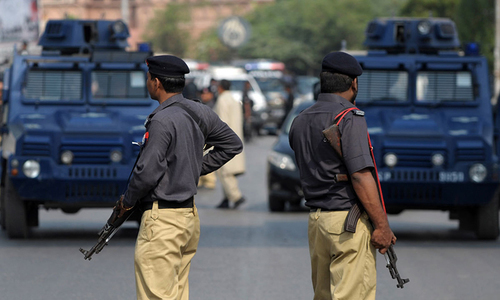KARACHI: The Sindh police are set to appoint more than 18,000 policemen — said to be the highest number of recruitment in recent years — in a move to enhance the manpower and improve the policeman-population ratio, which has remained abysmally low in the region for the past several years, officials said.
Of the total posts, 6,000 plus openings are for Karachi youngsters, over 1,500 for women and around 700 seats are reserved for members of the minority communities.
The officials said that under the defined rules and process, the Sindh police had invited applications from interested candidates having domicile of respective districts of the province for total 18,300 posts of police constables in BPS-5.
The announcement, they said, had generated a good response from youngsters and the number of applications was expected to jump manifold by Feb 15, the last day to apply.
The move will help improve the police-population ratio in Karachi
“The process has been made easier and one can download the application form from the website of the Pakistan Testing Service (PTS), which has been assigned for all required testing of the candidates to ensure transparency and merit-based recruitment,” said an official. “The age ranges between 18 and 28 years for the required posts depending on the districts. The current recruitments are primarily being conducted for three ranges of the police organisational structure — Karachi, Hyderabad and Sukkur — which consist of various districts of the province.”
For Karachi, he said, total 6,411 jobs were being offered that included 321 seats dedicated for minorities.
In Hyderabad, the vacancies of police constable stood at 7,404 with five per cent quota minority communities. In Sukkur, the total available jobs were 4,485 with the same ratio for the minority candidates.
The fresh set of recruitment, he said, also dedicated over 1,838 positions for women to be appointed as lady constables.
“The testing firm will conduct physical tests of candidates including measurement of their chest, height and running speed at locations selected by the Sindh police committee. Similarly, it will conduct a written test and also psychometric analysis of the candidates. The tests will be conducted in phases and the results will be compiled and forwarded to the Sindh police. The process may take a couple of months to complete before the final list of successful candidates is issued and they are called for training,” he said.
The fresh recruitment plan in the Sindh police came in line with the provincial government’s announcement made in the budget for financial year 2019-20.
The Sindh government had announced an over nine per cent increase in the budget for security in the province, fixing it at Rs109.788 billion for 2019-20 compared to Rs100.483bn allocated in the last fiscal year with a promise to make recruitment in the force.
“Apart from increasing the overall workforce in police, the move would definitely enhance the police-population ratio in Karachi,” said another official, who is a member of the Sindh police team looking after the recruitment process. “The ratio in Karachi is quite low and there is a realisation in the government circle that more police is needed in Karachi for effective policing.”
A decade-old study had revealed that Karachi had the lowest number of policemen per citizen in the region. The study suggested that the sanctioned strength was below the required level and the authorities needed to urgently review the security situation within the burgeoning metropolis, which is home to over 20 million people.
By 2008, it said, there was a single policeman in Karachi for the protection of the lives, property and legitimate interests of 571 people; whereas, according to the same study, in Lahore there was one policeman for every 287 people.
Published in Dawn, February 10th, 2020


















































